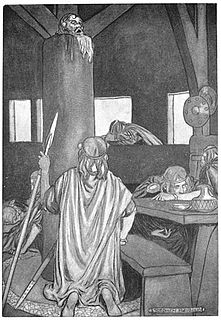Related Research Articles

Manannán or Manann, also known as Manannán mac Lir, is a warrior and king of the Otherworld in Irish mythology who is associated with the sea and often interpreted as a sea god, usually as member of the Tuatha Dé Danann.
Conall Cernach is a hero of the Ulaid in the Ulster Cycle of Irish mythology. He had a crooked neck and is said to have always slept with the head of a Connachtman under his knee. His epithet is normally translated as "victorious" or "triumphant", although it is an obscure word, and some texts struggle to explain it. Alternative meanings include "angular, having corners", "swollen", or "possessing a dish or receptacle". The original form of the name "Conall" in Ogham inscriptions was Cunavalas.
Conchobarmac Nessa is the king of Ulster in the Ulster Cycle of Irish mythology. He rules from Emain Macha. He is usually said to be the son of the High King Fachtna Fáthach, although in some stories his father is the druid Cathbad, and he is usually known by his matronymic, mac Nessa: his mother is Ness, daughter of Eochaid Sálbuide, King of Ulster.

Cú Chulainn, also spelled Cú Chulaind or Cúchulainn and sometimes known in English as Cuhullin, is an Irish mythological demigod who appears in the stories of the Ulster Cycle, as well as in Scottish and Manx mythology. He is believed to be an incarnation of the Irish god Lugh, who is also his father. His mother is the mortal Deichtine, sister of Conchobar mac Nessa.
In Irish mythology, Deichtine or Deichtire was the sister of Conchobar mac Nessa and the mother of Cú Chulainn. Her husband was Sualtam, but Cú Chulainn's real father may have been Lugh of the Tuatha Dé Danann.

Súaltammac Róich is the mortal father of the hero Cúchulainn in the Ulster Cycle of Irish mythology. His wife is Deichtine, sister of Conchobar mac Nessa, king of Ulster. His brother is Fergus mac Róich.

Emer[ˈẽβ̃əɾ], is an Irish name, in modern Irish Eimhear or Éimhear, daughter of Forgall Monach, is the wife of the hero Cú Chulainn in the Ulster Cycle of Irish mythology. Alternative version in Scottish Gaelic is Eimhir.
Lí Ban may refer to an otherworldly female figure in Irish mythology.
Scáthach, or Sgathaich, is a figure in the Ulster Cycle of Irish mythology. She is a legendary Scottish warrior woman and martial arts teacher who trains the legendary Ulster hero Cú Chulainn in the arts of combat. Texts describe her homeland as Scotland (Alpeach); she is especially associated with the Isle of Skye, where her residence Dún Scáith stands. She is called "the Shadow" and "Warrior Maid" and is the rival and sister of Aífe, both of whom are daughters of Árd-Greimne of Lethra.

Oisín, Osian, Ossian, or Osheen was regarded in legend as the greatest poet of Ireland, a warrior of the fianna in the Ossianic or Fenian Cycle of Irish mythology. He is the son of Fionn mac Cumhaill and of Sadhbh, and is the narrator of much of the cycle and composition of the poems are attributed to him.
In Celtic mythology, the Otherworld is the realm of the deities and possibly also of the dead.
Láeg, or Lóeg, son of Riangabar, is the charioteer and constant companion of the hero Cú Chulainn in the Ulster Cycle of Irish mythology. His horses are Liath Macha and Dub Sainglend.
In Irish mythology Tír na nÓg or Tír na hÓige is one of the names for the Celtic Otherworld, or perhaps for a part of it. Tír na nÓg is best known from the tale of Oisín and Niamh.
An Echtra or Echtrae, is type of pre-Christian Old Irish literature about a hero's adventures in the Otherworld or with otherworldly beings.

Tochmarc Emire is one of the stories in the Ulster Cycle of Irish mythology and one of the longest when it received its form in the second recension (below). It concerns the efforts of the hero Cú Chulainn to marry Emer, who appears as his wife in other stories of the cycle, and his training in arms under the warrior-woman Scáthach. The tochmarc is one of the 'genres' of early Irish literature recognised in the manuscript corpus.
Aided Óenfhir Aífe is a story from the Ulster Cycle of Irish mythology.

Serglige Con Culainn, also known as Oenét Emire is a narrative from the Ulster Cycle of Irish mythology. It tells of a curse that fell upon the warrior Cú Chulainn as a result of his attacking otherworldly women, and his eventual recovery by reluctantly agreeing to give military aid to those he had wronged. His developing relationship with one of the Otherworldly women, Fand, occasions his wife Emer's "only jealousy."
Compert Con Culainn is an early medieval Irish narrative about the conception and birth of the hero Cú Chulainn. Part of the Ulster Cycle of Irish mythology, it survives in two major versions.
Labraid Luathlám ar Claideb is a figure in Irish mythology, appearing in the medieval Ulster Cycle story Serglige Con Culainn. Here he is the ruler of Mag Mell. He is husband to Lí Ban, who woos Cú Chulainn for Lí Ban's sister Fand. According to his wife, Labraid was the best of all the warriors in the world.
References
- Serglige Con Culainn , ed. Myles Dillon (1953). Serglige Con Culainn. Mediaeval and Modern Irish Series 14. Dublin: DIAS.; tr. Jeffrey Gantz (1981). Early Irish Myths and Sagas. London: Penguin. pp. 155–78.
- The Sick-Bed of Cuchulain, an English translation of the above
- The Only Jealousy of Emer